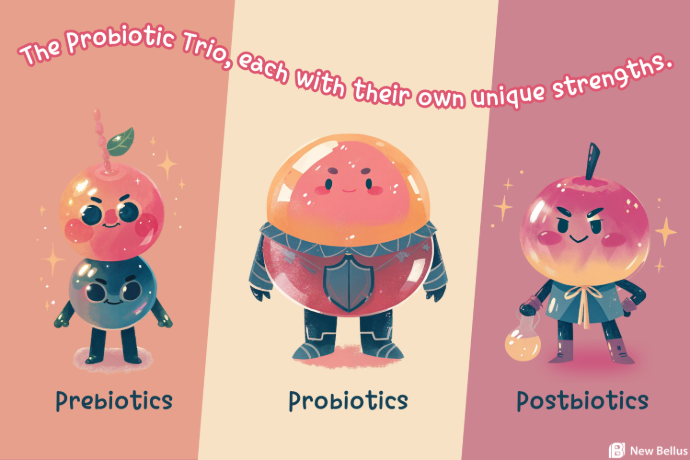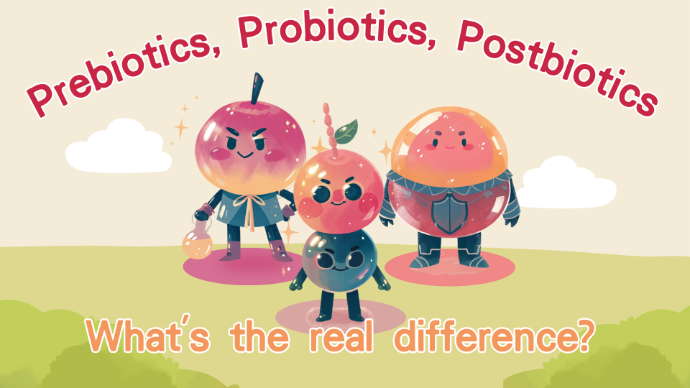
The Probiotics Trio, each with
their own unique strengths
Many people take “probiotics” but feel the results are inconsistent. A key reason is confusion between prebiotics, probiotics, and postbiotics. Think of them as three brothers in one family:
- Big Brother: Prebiotics → Feed beneficial gut bacteria and build a solid foundation.
- Second Brother: Probiotics → Living warriors that enter the gut and engage directly.
- Little Brother: Postbiotics → A flexible “skill pack” that works even without live bacteria.
They’re not substitutes—they’re complementary. With science-based combinations, you can amplify the value of gut-health strategies.

Prebiotics
Prebiotics are the “food” for beneficial gut bacteria. They promote the growth of Bifidobacteria and Lactobacillus, metabolized short-chain fatty acids (SCFAs), and further optimize gut pH and mineral absorption.
Key Benefits
- Feed good bacteria; improve microbiome balance
- Increase SCFAs; strengthen the intestinal barrier
- Support mineral absorption; maintain long-term stability
New Bellus Highlight Product: New Bellus
PrebioMix

Probiotics
Probiotics are the living
main players that can colonize and multiply in the gut, suppress harmful
bacteria, and modulate immunity. They also interact with the gut–brain
axis and gut–muscle axis to influence mood regulation,
stress response, and exercise performance.
Probiotics are extremely sensitive to environmental conditions. To ensure efficacy, we use a specialized fermentation process (New bellus patented fermentation) together with a five-layer freeze-dried micro-encapsulation technology, safeguarding viable cells and delivering them safely to the GI tract.
Read More
Key Benefits
- Restore microbiome balance; modulate immune function
- Interact with the gut–brain axis (mood and stress)
- Interact with the gut–muscle axis (muscle synthesis, endurance, post-exercise recovery)
New Bellus Highlight Products:
New Bellus
NB® 23 Clinically Patented Probiotics, New Bellus
Functional Multi-Strain Probiotics Series, New Bellus
Probio-BAC Multi-Strain Probiotics Series

Postbiotics
Postbiotics are the “skill pack” of
probiotics—covering metabolites (SCFAs, peptides, polysaccharides,
antimicrobial peptides, etc.) and processed bacterial components (including
heat-treated cells and cell-wall fragments). Postbiotics do not rely
on live bacteria to act; they are highly stable and much more
flexible for product applications.
Key Benefits
- Anti-inflammatory and immune-modulating effects
- Strengthen the gut barrier and support repair
- Heat-/acid-stable and highly versatile in formulations
New Bellus Highlight Products:
Metabolite-based postbiotics: PostbioGABA™ ,PostbioACV™ , PostbioKom™
Cell-based postbiotics: New Bellus NB® 23 Postbiotic
One-Glance Comparison Table
| Category | Definition | Features/Function | Stability | Application Advantages |
|
Prebiotics |
Food for good bacteria (oligosaccharides/fibers)
|
Promote beneficial growth, boost SCFAs, optimize pH & absorption |
High
|
Powders, capsules, nutrition bars; foundational
support
|
| Probiotics | Live beneficial microbes | Colonize/multiply in gut; modulate immunity; influence gut–brain & gut–muscle axes | Medium (require protection/cold chain) |
Powders, capsules, fermented drinks; rapid microbiome
support
|
|
Postbiotics
| Probiotic metabolites and/or processed
bacterial cells (※ includes heat-treated cells) | Anti-inflammatory, immune support, barrier repair; direct effects | High (heat/acid-resistant) |
Beverages, beauty drinks, bars; widest application
range |
How to Combine Them Most Effectively?

Prebiotics + Probiotics
Build the base and help live bacteria act more durably.

Postbiotics
Probiotics +
Live bacteria tune the environment; postbiotics
deliver rapid support.

Prebiotics +
Postbiotics
Useful even without emphasizing live bacterial
survival;
supports gut immunity.

All Three
Foundation × Colonization × Reinforcement
—the most
comprehensive combo
Postbiotics:
The Rising Blue Ocean
Historically, discussions about probiotics focused on CFU counts and survivability. In recent years, postbiotics have gained momentum as a favorite in functional food R&D because they bypass live-bacteria limitations.
1.
Sports Nutrition
Based on New Bellus’ latest
research [1], New Bellus NB® 23 Postbiotics enhance lactate
clearance and muscular endurance; they accelerate ammonia and urea nitrogen
removal, reduce post-exercise inflammation, and shorten recovery time. For
athletes and fitness enthusiasts, this “immediate + stable” profile fills gaps left by live
probiotics and traditional bacterial materials.
2.
Beauty & Wellness
Postbiotics influence the gut–skin axis.
Polysaccharides and lactic-acid derivatives can stimulate collagen synthesis
and reduce skin inflammation—hence their wide use in beauty beverages
and nutricosmetics. This “gut care × skin benefits” dual value makes
postbiotics a key ingredient for women’s health and beauty markets
3.
Versatile Applications
Their greatest advantage is formulation
flexibility. Being heat-/acid-stable and not requiring a cold chain,
postbiotics can be used in beverages, bars, capsules, infant formulas, and
senior products—earning the reputation of a truly “all-rounder
ingredient.”
4.
Market Outlook
According to MarketsandMarkets [2], the
global postbiotics market will grow from USD 146.7 million in 2025 to USD 224.8
million by 2030, at a CAGR of 8.9%.
👉Postbiotics are
not merely an extension of probiotics—they are poised to become a core focus
of the next health wave.
Small Things Creating Big Value
The three brothers—prebiotics, probiotics, and postbiotics—are complementary, not interchangeable. With the right goals and smart combinations, products can achieve greater stability, efficacy, and versatility.
As a leader in microbial fermentation, New Bellus upholds “Small Things Creating Big Value — Micro-Fermentation, Infinite Value.” We provide one-stop solutions—from New Bellus PrebioMix, to clinically patented multi-strain probiotic solutions, to New Bellus NB® 23 Probiotics and New Bellus NB® 23 Postbiotics—helping brands develop differentiated, forward-looking innovations.
[R&D Trend] Still Competing on "CFU Counts"? Meet the "Biotic Trio" and Master Next-Gen Opportunities!
Discover the golden triangle relationship between Probiotics, Prebiotics, and Postbiotics in our "Biotic Trio" video series
FAQ
Q1: What’s the difference between prebiotics and
probiotics?
A1: Prebiotics are “food” for good bacteria, helping
them multiply and boosting SCFA production. Probiotics are live beneficial
bacteria that must be consumed in sufficient amounts and remain viable to
deliver benefits.
Q2: How are postbiotics different from probiotics?
A2: Probiotics need to be alive when they reach the gut. Postbiotics are probiotic-derived metabolites or processed bacterial cells (including heat-treated cells) that work without live bacteria, supporting immunity and barrier repair.
Q3: Which type is most suitable for foods and
beverages?
A3: Postbiotics—because they’re heat/acid stable and require
no cold chain—are ideal for drinks, beauty beverages, and bars. Prebiotics are
also widely used in foods; probiotics require more rigorous protection.
Q4: Do you need all three together?
A4: Not necessarily. Choose based on your goals and
formulation:
- Daily foundation → prebiotics or probiotics
- Immediate support → add postbiotics
- Comprehensive care → all three can be more complete, but not everyone needs the full combo
Reference:
[1] Lee, M.-C.; Cheng, T.-Y.; Lin,
P.-J.; Lin, T.-C.; Chou, C.-H.; Chen, C.-Y.; Huang, C.-C. Supplementation with
Live and Heat-Treated Lacticaseibacillus
paracasei NB23 Enhances Endurance and Attenuates Exercise-Induced Fatigue
in Mice. Nutrients 2025, 17, 2568.
[2]
MarketsandMarkets. Postbiotics Market—Global Forecast to 2030.
https://www.marketsandmarkets.com/PressReleases/postbiotics.asp
